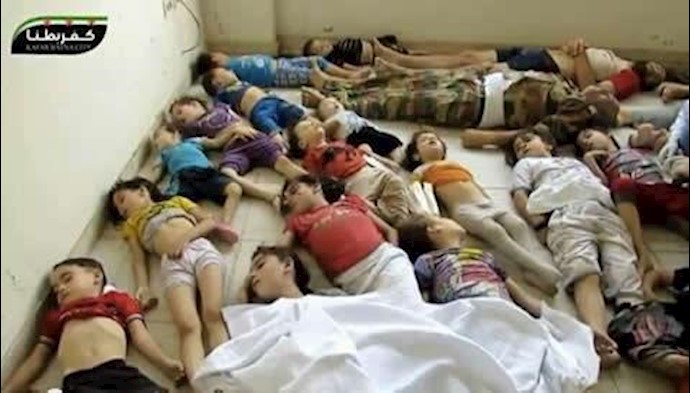UN Special Envoy for Syria Staffan de Mistura said on Thursday that the international body is investigating if chlorine gas has been used in a deadly attack the day before in the divided city of Aleppo.
“There is a lot of evidence that it actually did take place,” de Mistura told reporters, adding that if confirmed the attack would amount to a war crime.
A hospital and a civil defense group told Reuters that at least four people died and many suffered breathing difficulties when a gas, believed to be chlorine, was dropped alongside barrel bombs on the neighborhood of Zabadieh in Aleppo on Wednesday night.
Hamza Khatib, the manager of Al-Quds hospital in Aleppo, told a Reuters photographer the hospital had recorded four deaths from gas poisoning and 55 injuries. Seven people were still receiving hospital treatment.
Khatib said he was preserving pieces of patients clothing and fragments from the barrel bombs as evidence for analysis.
Khaled Harah, a rescue worker, told the Associated Press that one of the barrel bombs drops released chlorine gas.
So far, it is not clear how it was determined that chlorine gas was released.
Meanwhile, the Syrian Observatory for Human Rights, a war monitor, said helicopters dropped explosive barrels on the neighborhoods of Seif al-Dawla and Zabadieh, leading to the death of a woman and her child from suffocation.
Reiterating the UN’s war crime warning, Amnesty International said in a statement that the attack on the neighborhood is “the third reported use of chemical weapons in northern Syria in just two weeks and has reportedly killed at least four people.”
The human rights NGO said it has confirmed at least 60 others, mostly children, sought medical care after showing symptoms characteristic of a chlorine attack.
“This attack in Aleppo is yet another flagrant violation of international humanitarian law and signals a distressing pattern in the use of chemical weapons by regime forces,” said Magdalena Mughrabi, Amnesty International’s Deputy Director of the Middle East and North Africa Program.
The accusations came hours after the Russian military, which is fighting alongside Syrian government forces, promised a daily, three-hour ceasefire for Aleppo to allow humanitarian aid into besieged areas.
“We call for the immediate cessation of air raids on civilian targets in Aleppo. It is imperative that chemical attacks and other war crimes end now. We also call for the unrestricted free flow of aid to the tens of thousands of people trapped in the city’s east,” said Mughrabi.
Yet another chlorine gas attack?
Amid highly-charged political climate, challenges lie ahead to prove the recent incidents and bring forth action against the culprits.
London-based Sabah al-Mukhtar, the president of the Arab Lawyers Association (IADL), told Al Arabiya English if “everything is proven,” then the UN Security Council must take a “decision” on what needs to be done, describing how the United States is still not ready to be further involved in the Syrian conflict..
On Aug. 20, 2012, US President Barack Obama famously warned the Syrian regime over any chemical arms usage, saying it was a “red line.”
But after one year of Obama’s warning, sarin gas was unleashed on Syrian civilians in the populated suburbs to the east and south of the capital Damascus, Ghouta, with varying sources giving the death toll of 322 to 1,720 over what the UN described as “crimes against humanity.”

The Ghouta attack did not bring the wrath of the Obama’s administration nor any military action. However, the UN Security Council adopted a resolution ordering Assad’s regime to eliminate its chemical weapons.
Assad then agreed to eradicate chemical arms from Syria by the Organization for the Prohibition of Chemical Weapons (OPCW). By the second half of 2014 this was largely attained.
Meanwhile, OPCW said Thursday that reports of possible chemical weapons use in Syria “are of great concern” and said it continues to examine any credible reports it received.
Chlorine has a number of civilian applications but can also be used as a crude weapon. It is fatal in high concentrations, while in lower doses it can damage lungs or cause severe breathing difficulties, vomiting and nausea.
Source: Al Arabiya, AP, Reuters, , 12 August 2016








